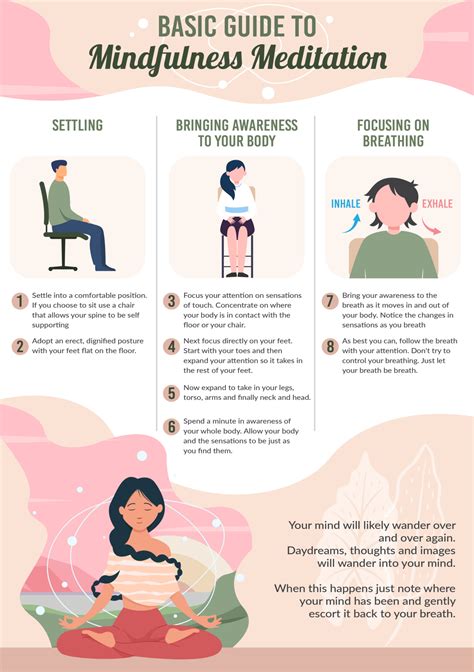Intro
Boost mental wellness with 5 mind-body tips, incorporating mindfulness, meditation, and self-care to reduce stress and anxiety, promoting holistic well-being and emotional balance.
The connection between our minds and bodies is a powerful one, influencing our overall well-being and quality of life. By fostering a strong and positive relationship between these two entities, we can unlock our full potential, leading to a happier, healthier existence. The mind-body connection is not just a concept; it's a tangible force that can be harnessed and strengthened through practice, patience, and dedication. In today's fast-paced world, where stress and anxiety are commonplace, it's more important than ever to prioritize our mental and physical health. By doing so, we can improve our resilience, boost our mood, and enhance our ability to cope with life's challenges.
Understanding the mind-body connection is the first step towards harnessing its power. Our thoughts, emotions, and physical sensations are intricately linked, with each influencing the others in profound ways. For instance, stress and anxiety can manifest physically as tension, headaches, or digestive issues, while a healthy body can contribute to a clearer, more positive mind. This interplay highlights the importance of adopting a holistic approach to health, one that addresses both the mental and physical aspects of our being. By acknowledging and respecting this connection, we can begin to make conscious choices that nurture our overall well-being.
The journey to a stronger mind-body connection starts with small, manageable steps. It involves becoming more aware of our thoughts, feelings, and physical sensations, and learning to listen to our body's signals. This heightened awareness allows us to respond to our needs more effectively, whether that means taking a moment to breathe and relax, engaging in physical activity, or seeking support from loved ones or professionals. As we cultivate this awareness and make positive changes, we begin to notice profound shifts in our energy, mood, and overall sense of well-being. It's a journey that requires commitment and kindness towards ourselves, but the rewards are well worth the effort.
Mindfulness and Meditation

Getting Started with Mindfulness
To begin a mindfulness practice, find a quiet and comfortable spot where you can sit without distraction. Close your eyes and bring your attention to your breath, noticing the sensation of the air entering and leaving your nostrils. When your mind wanders, gently bring it back to your breath without judgment. Start with short sessions, perhaps 5-10 minutes, and gradually increase the duration as you become more comfortable with the practice. Remember, the goal of mindfulness isn't to achieve a specific state but to cultivate awareness and acceptance of the present moment.Physical Activity and Exercise

Benefits of Regular Exercise
The benefits of regular exercise are numerous and well-documented. It can increase energy levels, improve cognitive function, and support weight management. Exercise also provides opportunities for social interaction, whether through group fitness classes, team sports, or simply exercising with a friend. This social aspect can enhance the mental health benefits of physical activity, providing support and motivation. For those who are new to exercise or have been inactive for a while, it's important to start slowly and build up gradually. This approach can help prevent injury and make the experience more enjoyable.Nutrition and Diet

Healthy Eating Tips
Incorporating healthy eating habits into your lifestyle can seem daunting, but it can be approached in a step-by-step manner. Start by adding more fruits and vegetables to your meals, aiming for a variety of colors to ensure a broad range of nutrients. Whole grains, such as brown rice, quinoa, and whole-wheat bread, provide sustained energy and fiber. Lean proteins like chicken, fish, and beans are essential for muscle health and satisfaction. Limiting processed foods and sugary snacks can also make a significant difference, replacing them with healthier alternatives like nuts, seeds, and dried fruits.Sleep and Relaxation

Improving Sleep Quality
Improving sleep quality involves creating a sleep-conducive environment and adopting consistent sleep habits. This can include making your bedroom a sleep haven by ensuring it's dark, quiet, and at a comfortable temperature. Establishing a bedtime routine can signal to your body that it's time to sleep, whether that involves reading a book, taking a warm bath, or practicing gentle stretches. Avoiding screens and electronic devices before bedtime is also advisable, as the blue light they emit can interfere with your body's production of melatonin, the sleep hormone.Connection and Community

Nurturing Relationships
Nurturing our relationships involves effort and commitment from all parties involved. Regular communication, active listening, and empathy are key components of healthy relationships. Making time for activities and hobbies with loved ones can strengthen bonds and create lasting memories. It's also important to prioritize self-care and personal growth, as a fulfilled and happy individual is better equipped to nurture and contribute to meaningful relationships.What are some simple ways to improve my mind-body connection?
+Simple ways to improve your mind-body connection include practicing mindfulness, engaging in regular physical activity, eating a balanced diet, getting enough sleep, and nurturing your relationships. Starting small and being consistent can lead to significant improvements over time.
How can I make mindfulness a part of my daily routine?
+You can incorporate mindfulness into your daily routine by starting with short mindfulness exercises, such as focusing on your breath or body sensations, and gradually increasing the duration as you become more comfortable with the practice. You can also use mindfulness apps or guided meditations to help you get started.
What role does nutrition play in my mental health?
+Nutrition plays a significant role in mental health. Eating a diet rich in whole foods, fruits, vegetables, whole grains, and lean proteins can provide the necessary nutrients for optimal brain function and mental well-being. A healthy diet can help manage symptoms of mental health conditions, support energy levels, and influence mood.
As we embark on the journey to strengthen our mind-body connection, it's essential to approach the process with kindness, patience, and an open mind. By embracing the interconnectedness of our mental and physical health, we can unlock a path to a more balanced, fulfilling life. Remember, small steps today can lead to significant improvements tomorrow. So, take that first step, whether it's trying a mindfulness exercise, going for a walk, or simply taking a few deep breaths. Your mind and body will thank you, and together, they will guide you towards a brighter, healthier future. Share your thoughts and experiences on nurturing your mind-body connection, and let's support each other on this journey to well-being.
